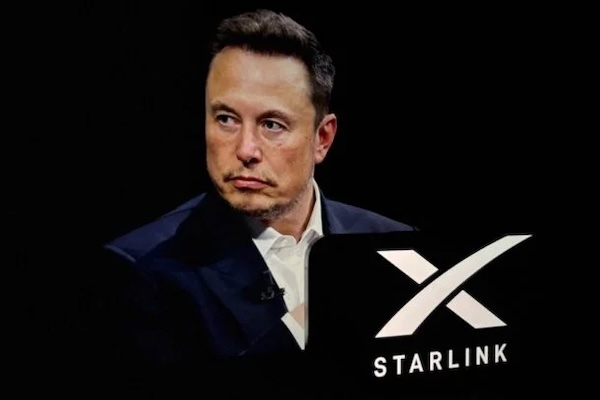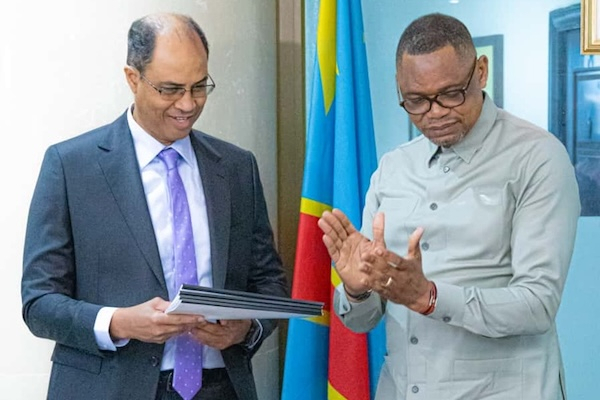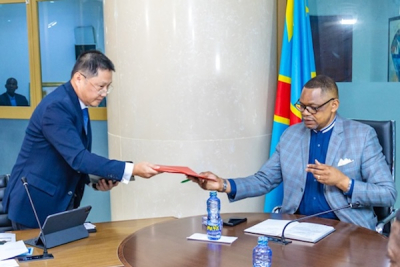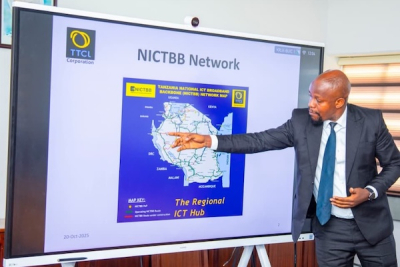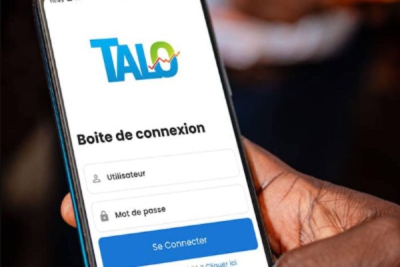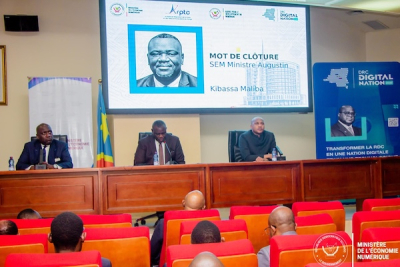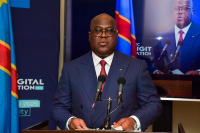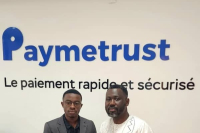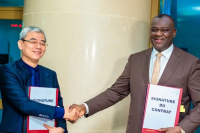
DIGITAL (56)
Telecom operators Africell and Vodacom, active in the Democratic Republic of Congo (DR Congo), are exploring potential partnerships with Starlink, the global satellite Internet provider, to expand their network coverage nationwide.
Africell DR Congo CEO Kory Webster confirmed to U.S. media outlet Semafor that the company is holding “active discussions” with Starlink on an operational partnership. A Vodacom executive, also quoted by the outlet, said the operator is considering a similar satellite collaboration to strengthen coverage in rural and hard-to-reach areas. No further details have been disclosed.
In May 2025, Airtel Africa signed a partnership with SpaceX, making it the first operator in DR Congo to collaborate with Starlink. Vodacom and Africell’s current moves appear to be a response to this competitive advantage.
Experts say Starlink’s network could be used to connect base transceiver stations (BTS) in remote areas to telecom operators’ core networks, where voice and data traffic are managed. The solution is seen as a lower-cost alternative to the VSAT technology currently in use and could help operators expand coverage while improving commercial and financial performance.
The Airtel–SpaceX partnership therefore gives Airtel Congo a strategic edge in the race for an estimated 15 million new mobile Internet subscribers expected in DR Congo between 2025 and 2030, according to GSMA projections.
Data from the Congolese postal and telecom regulator (ARPTC) show that by the end of 2024, the country had 32.94 million active mobile Internet subscriptions (90-day basis). Airtel had 9.66 million users, representing 29.33% of the market, behind Vodacom (37.78%) and Orange (29.97%), but ahead of Africell (2.92%). However, in terms of Internet revenue, Airtel led with $365.5 million (37.7% market share), followed by Orange (31.5%), Vodacom (27%), and Africell (3.8%).
The Democratic Republic of Congo (DRC) signed an agreement on Oct. 20 with Mauritius-based investment firm United Investment LMT (UIL) to strengthen its national digital infrastructure, Congolese media reported. The partnership, first agreed in 2023, is estimated to be worth about $150 million.
The project covers feasibility studies, the rollout of 60,000-80,000 kilometers of fiber-optic cable nationwide, the installation of a new 192-terabit-per-second submarine cable, and the construction of three data centers, according to Scoop RDC. It will also include the establishment of a national telecom operator providing both fixed and wireless services. No implementation timeline was provided.
“The DRC needs at least 40,000 to 50,000 kilometers of fiber to achieve full connectivity. Internet access remains below 30%,” said José Mpanda Kabangu, Minister of Posts and Telecommunications, during the signing of supplementary documents with UIL. “The President wants all 145 territories of the country to be connected. I wish this project every success and will give it my full support.”
Expanding digital infrastructure and connectivity is one of four key goals of the 2026–2030 National Digital Plan (PNN2), which seeks to position the DRC as a regional digital hub. To support the strategy, the government plans to invest $1 billion over five years, alongside $500 million in external funding from international partners.
The country is also pursuing other public-private partnerships. Nigeria’s Fidelity Bank has expressed interest in financing a national telecom satellite project to improve connectivity.
The DRC scored 31/100 on the ITU’s 2024 ICT Development Index, ranking 41st out of 47 African countries. According to GSMA, about 32% of the population still lacked mobile internet coverage in 2024. The organization also noted that the DRC had around 9,631 kilometers of fiber installed, with another 29,000 kilometers planned by public and private operators. The country is connected to the WACS and 2Africa submarine cables, according to Submarine Cable Map.
Isaac K. Kassouwi, Ecofin Agency
Esengo Towers, a joint venture between Orange RDC and Vodacom Congo, plans to invest $179 million over four years to deploy 1,000 telecom towers across the Democratic Republic of Congo (DRC) to expand mobile coverage.
Esengo Towers CEO Jean-Philippe Léonard announced the plan on Oct. 22, 2025, after meeting with Minister of Posts and Telecommunications José Mpanda Kabangu.
The company, founded in January 2025 and equally owned by the two mobile operators, aims to expand rural connectivity by building solar-powered base stations equipped with 2G and 4G technology. It also targets the construction of 2,000 towers within six years.
The project has faced delays. The first station was expected to be operational by end-2025, but the firm still lacks an operating license. Léonard said obtaining the license is crucial before choosing suppliers and finalizing financing, and he now expects construction to begin in 2026.
He asked the minister to help secure authorization from the Regulatory Authority of Posts and Telecommunications (ARPTC). In a ministry statement, Kabangu expressed government support and noted that the DRC needs about 300,000 towers for full coverage, compared with 5,105 currently.
“The 2,000 towers planned by Esengo Towers, though not enough to meet national needs, represent a major contribution, especially for rural areas,” Kabangu said.
Orange RDC and Vodacom Congo will share the infrastructure as anchor tenants for 20 years and open it to other operators to share costs and broaden coverage, targeting 19 million new users and promoting digital inclusion and mobile financial access.
Ronsard Luabeya
Tanzania’s plan to extend its National ICT Broadband Backbone (NICTBB) to the Democratic Republic of Congo (DRC) was discussed on Oct. 20, 2025, during a meeting at Tanzania Telecommunications Corporation (TTCL) headquarters in Dar es Salaam.
The project will lay a submarine fiber-optic cable across Lake Tanganyika, linking Kigoma in Tanzania and Kalemie in the DRC over roughly 160-186 kilometers.
The Tanzanian delegation was led by Moremi Marwa, TTCL Director General, and Leo Magomba, ICT Infrastructure Director at the Ministry of Communication and Information Technology. The Congolese side was headed by Prosper Ghislain Mpeye, Director General of the Société Congolaise de Fibre Optique (SOCOF).
Few details were disclosed, as the talks are covered by a confidentiality agreement signed in February 2023. The two sides are completing final preparations before construction begins in early 2026, pending environmental approval. Full commissioning is expected by late 2027.
The $15-20 million project is structured as a public-private partnership involving Mauritian firm Bandwidth and Cloud Services Group for technical expertise. The governments of both countries will hold quarterly meetings to track progress and manage financial risks.
Part of the AUDA-NEPAD Priority Action Plan (2021-2030), the interconnection is identified as a key link for digital integration in East and Southern Africa. The NICTBB already connects Zambia, Malawi, Kenya, Uganda, Rwanda, and Burundi; adding the DRC would complete an East–West fiber corridor, boosting regional connectivity.
TTCL, the implementing agency, said the project will accelerate the DRC’s digital transformation and spur economic growth. Fiber deployment could cut bandwidth costs by half and benefit sectors from mining to digital finance, education, and healthcare.
The cable will use single-mode G.652D fiber, starting at 100 Gbps, expandable to several terabits. Joint environmental studies with the Société Congolaise des Postes et Télécommunications (SCPT) aim to ensure compliance with international standards, including the Ramsar Convention protecting Lake Tanganyika.
The TALO price-control app is scheduled to begin its rollout in November across several cities in the Democratic Republic of Congo (DRC). The announcement was made on Tuesday, October 7, 2025, by Minister of National Economy Daniel Mukoko Samba during an interview on Kinshasa-based Top Congo FM.
The minister said the first phase will cover seven major cities, with six more to follow by year-end. The goal is to enable real-time tracking of prices for food and other staple consumer goods.
Developed by young Congolese professionals, TALO was unveiled by Minister Mukoko Samba on January 14, 2025. Designed to modernize the economic inspection service, the app helps field agents collect data more efficiently and increases transparency in business practices for consumers.
In Kinshasa, where the application is already in use, TALO has replaced manual price reporting. Agents now record data on their phones at market sites and send it directly to a central database. According to Jocelyne Mayungu Bwanga, head of the Kinshasa-East office at the Ministry of National Economy, the switch to digital data collection has significantly reduced processing times.
The ministry posts monthly reports on its official website summarizing the data. The latest report, for July, showed that weekly price tracking in Kinshasa covered 39 staple consumer products, 183 brands, and 62 types of traders across 16 markets, including Central, Gambela, Zigida, and Liberté.
Price differences of up to 40% were sometimes observed for the same product between different outlets. To identify the underlying causes, the ministry has commissioned a Congolese consulting firm to conduct a study. One preliminary finding points to two main supply routes: goods entering through the Lufu border with Angola tend to be cheaper than those coming via Matadi port.
By expanding TALO to the provinces, the Ministry of National Economy aims to strengthen its nationwide price-monitoring and regulatory capacity. The ultimate goal is to curb market speculation and protect consumers’ purchasing power.
Timothée Manoke
• The Democratic Republic of Congo (DRC) plans to invest $1 billion in public funds and secure an additional $500 million from international partners to implement its new five-year digital strategy.
• The plan aims to transform the DRC into a regional digital hub by 2030, with a focus on AI, connectivity, and digital inclusion.
• The country’s first national artificial intelligence (AI) strategy will include the creation of a Congolese AI academy to train young talent and foster innovation.
The Democratic Republic of Congo (DRC) has launched the drafting process for its National Digital Plan 2026–2030 (PNN2) and its first National Artificial Intelligence Strategy, the Ministry of Digital Economy said on Wednesday.
Minister Augustin Kibassa Maliba announced the initiative, which aims to position the DRC as a regional digital hub by 2030.
“This is about capturing the dividends of digital transformation and positioning our country — rich in critical minerals essential to the digital and energy transitions — as both an investment catalyst and a provider of solutions to global challenges,” Kibassa said.
The new plan will rest on four main pillars: infrastructure and connectivity development, creation of digital public platforms and services, human capital enhancement and digital inclusion, and strengthening of cybersecurity and digital trust.
It will also integrate five cross-cutting axes — digital entrepreneurship, innovation, technological sovereignty, artificial intelligence, and strategic partnerships — to ensure coherence across policy areas.
To support this roadmap, the government plans to invest $1 billion in public funds over five years, complemented by $500 million in external financing already secured from international partners.
As part of the AI strategy, authorities will establish a Congolese Artificial Intelligence Academy to train young professionals, promote applied research, and stimulate local innovation.
This initiative follows the National Digital Plan “Horizon 2025”, launched in 2019, which achieved about 60% of its objectives. The first plan laid the groundwork for the digital economy through improvements in fiber-optic connectivity, regional integration projects such as CAB5, and the introduction of e-government tools like online tax portals and customs modernization via a single window system.
Ongoing projects include the digitization of civil registration and the establishment of a national digital ID system.
With PNN2, Kinshasa seeks to consolidate these achievements and accelerate its digital transformation. A GSMA report presented last month estimated that digital technologies could contribute 9.8 trillion Congolese francs (about $3.6 billion) to the economy by 2029, provided that fiscal and regulatory reforms advance.
The same report suggested that digital adoption could unlock 8.6 trillion FC in additional economic value across mining, agriculture, and public services.
Through this new strategy, the DRC aims to strengthen its technology ecosystem, create thousands of skilled jobs, and attract more investment in high-growth digital sectors.
This article was initially published in French by Samira Njoya, Agence Ecofin
Adapted in English by Ange Jason Quenum
• GSMA estimates telecom reforms could generate 9,800 billion Congolese francs ($3.7 billion) in GDP by 2029.
• Mobile operators in DRC face a tax burden of 91% of profits, among the heaviest compared to mining (71%) and banking (34%).
• The sector could connect 9.7 million new mobile internet users and unlock $3.2 billion in value across mining, agriculture, and public services.
The first Digital Africa Summit in Kinshasa on Sept. 18 became a platform for mobile operators to advocate tax and regulatory reforms in the Democratic Republic of Congo (DRC). The push relied on a report by the GSMA, the global mobile industry association, titled “Driving Economic Growth through Digital Transformation in the DRC.”
Angela Wamelo, GSMA’s Africa director, said the reforms could add 9,800 billion Congolese francs ($3.7 billion) to GDP and connect 9.7 million additional mobile internet users by 2029. The report projected that mobile adoption could release more than 8,600 billion Congolese francs ($3.2 billion) in value across mining, agriculture, and public services.
“The Democratic Republic of Congo has the opportunity to leapfrog into a digital-driven economy,” Wamelo said. “But to realize this potential, reforms in taxation, spectrum management, and energy infrastructure must be a priority. We aim to regulate this sector in DRC to make it more transparent and attract investors,” she added.
A separate GSMA report from June, “Mobile Sector Taxation: Comparative Tax Burden in DRC,” highlighted the heavy fiscal environment operators face. It said mobile operators pay on average 91% of their profits in taxes, compared with 71% for mining companies and 34% for retail banks. The report blamed multiple sector-specific levies, often calculated on revenues, for deterring investment and limiting service expansion.
The GSMA urged simplification and harmonization of taxes. It recommended modernizing fiscal frameworks through rationalization of sectoral taxes to lower consumer prices and encourage investment. It also called for a collaborative national framework, coordination of energy and digital policies, expanded spectrum access, license reform, skills development through public-private partnerships, and integration of mobile platforms into education, health, and government services.
The government, facing major financing needs, has argued that telecom operators must pay their “fair share” of taxes. Some officials questioned the fiscal contribution of multinational operators, noting that some had not declared taxable profits in nearly two decades, raising suspicions of tax avoidance.
Despite these concerns, Digital Economy Minister Augustin Kibassa Maliba welcomed the GSMA report. He described it as a “clear diagnostic” of the sector’s progress and challenges. “We have the responsibility to transform the recommendations of this report into concrete actions, because it is through them that we will build a true digital economy,” he said.
According to GSMA, the mobile sector contributed an estimated $63–64 billion to DRC’s GDP in 2022 and $66 billion in 2023.
This article was initially published in French by Ronsard Luabeya
Adapted in English by Ange Jason Quenum
• President Félix Tshisekedi pledged $1 billion in public spending from 2026–2030 to implement the new national digital plan.
• The program will focus on infrastructure, e-government, cybersecurity, and digital skills training, with emphasis on women and youth.
• DRC signed an MoU with Cisco and Cybastion to train 250,000 young people in cybersecurity, data science, and programming.
Democratic Republic of Congo (DRC) President Félix Tshisekedi announced a $1 billion public investment to support the country’s next five-year digital development plan. The pledge, made Sept. 26 during the “DRC Digital Nation 2030” event at the UN General Assembly in New York, represents an annual commitment of $250 million from 2026 to 2030.
Tshisekedi said the initiative aims to position Congo as a technology hub at the heart of Africa.
According to the Ministry of Digital Affairs, the program will center on four pillars: expanding digital infrastructure such as connectivity and data hosting, developing e-government services, strengthening cybersecurity governance, and building digital skills. Training programs will prioritize women and young people.
Dominique Migisha, head of the Digital Development Agency, said unfinished projects from the current plan—achieved at roughly 60% due to funding gaps—will be incorporated into the new program.
Tshisekedi stressed that digital development depends on political stability and implementation of peace accords with Rwanda and the M23 rebels. Security improvements are also vital to attract private investors.
On the sidelines of the forum, Digital Minister Kibassa Maliba held talks with U.S.-based Unity Development Fund, which expressed interest in investing in infrastructure, innovation, and youth entrepreneurship.
Congo also signed a memorandum of understanding with Cisco and Cybastion to train 250,000 young people over five years in fields such as cybersecurity, data science, programming, operating systems, technical English, digital transformation, and entrepreneurship.
This article was initially published in French by PM & Ecofin Agency
Adapted in English by Ange Jason Quenum
Highlights:
• Fintech Paymetrust approved by Congo’s central bank as aggregator on July 4.
• Platform offers real-time supervision of financial flows, enhancing compliance.
• Already active in 14 African countries with over 10 million transactions in 2023.
Fintech company Paymetrust announced it had received, since July 4, 2025, approval from the Banque Centrale du Congo (BCC) to operate as an aggregator in the Democratic Republic of Congo (DRC). This allows the startup to legally provide its services in the country.
“This approval reflects our commitment to contributing to the development of the Congolese digital ecosystem. We want to offer reliable solutions that accelerate the digitization of payments while complying with the strict standards of the Central Bank,” said CEO Moussa Haïdra.
The company’s technology platform enables regulators and stakeholders to monitor financial flows in real time, strengthening traceability, transparency, compliance, and transaction security. In line with BCC requirements, Paymetrust will also connect to the national electronic money switch to ensure interoperability.
Its unified API allows seamless integration between ecosystem players, a major challenge in Congo’s fragmented payments market. Paymetrust already operates in 14 African countries, including Senegal, Cameroon, Côte d’Ivoire, and Tanzania, and processed more than 10 million transactions worth $5 million in 2023.
The platform supports over 65 payment methods — from mobile money to bank cards and e-wallets — and offers an intuitive dashboard for merchants and users. Payments can be made in five currencies: XAF, XOF, GNF, TZS, and USD.
Ronsard Luabeya
Highlights
• Singapore firm secures funds via PIPE transaction led by Chaince Securities.
• Proceeds to support launch of DRCPass, Congo’s national e-ID platform.
• System aims to curb SIM fraud, streamline e-services, boost financial inclusion.
Trident Digital Tech Holdings Ltd said on Sept. 16 it had raised $2.6 million to fund the launch of the Democratic Republic of Congo’s digital ID system. The Singapore-based company said the proceeds, net of costs, will go to the expansion and commercialization of DRCPass.
The system, developed under a public-private partnership with Kinshasa, will make Trident the DRC’s exclusive provider of electronic ID services (e-KYC) which uses Web3-based technologies. The system will enable biometric SIM authentication, and single sign-on access to public services.
The financing was arranged through a Private Investment in Public Equity (PIPE) deal led by Chaince Securities, a unit of Mercurity Fintech Holding. Trident issued Class B shares with reduced voting rights to undisclosed institutional investors. A resale registration statement will be filed with the US SEC.
Authorities say the platform is expected to cut fraud linked to fake SIM cards, expand e-government services, improve access to credit, and serve as a secure complement to physical ID. Before the official launch, DRCPass must clear audits, pilot tests, and a nationwide awareness campaign.
More...
-
Visa launches Visa Pay app in Kinshasa to boost digital payments and financial inclusion
-
Service supports CF and USD transactions, with low-cost bank account options for unbanked users
-
Five banks onboard, with more joining soon; DRC chosen as pilot market due to high cash usage
Visa has launched its Visa Pay mobile application in Kinshasa, aiming to expand access to digital financial services in the Democratic Republic of the Congo (DRC), where cash remains the dominant payment method.
Launched on September 4, the app allows users to transfer money, pay merchants, make deposits and withdrawals, and shop online using virtual cards. Transactions can be made in both Congolese francs (CF) and U.S. dollars (USD).
Sophie Kafuti, General Manager of Visa DRC, said the initiative seeks to reduce costs, improve interoperability, and support financial inclusion. “Today in the DRC, there are several fragmented payment systems. With Visa Pay, payments become secure, fast, and reliable, accessible to students and seniors alike, whether banked or unbanked,” she said.
Accessible, low-cost tool
Designed to consume little mobile data and memory, Visa Pay also allows users without a bank account to open one at low cost with partner banks. “Thanks to agreements with Visa, people can access affordable banking services,” said François Jurd De Girancourt, Visa Vice President for Strategy in Central Europe, the Middle East, and Africa.
The rollout begins with five banks — Access Banque, FBN, Sofibanque, Solidaire Banque, and UBA — with BGFIBank, Equity Bank, and TMB expected to join shortly. The app is also available via partner banks’ mobile platforms and can be downloaded from the App Store and Google Play.
Pilot Phase
Visa chose the DRC as a pilot market due to its high reliance on cash. The country’s financial ecosystem, combining banks and mobile operators, was seen as favorable for building an interoperable solution.
The launch follows Visa’s expansion in the DRC since 2022, including partnerships with Vodacom — which issued 150,000 Visa cards linked to M-Pesa — and a $1 million financial education program with the Financial Inclusion Fund (FPM).
Ronsard Luabeya
A partnership with Monaco-based satellite operator Monacosat will enable the Democratic Republic of Congo to acquire a satellite for an estimated $400 million, the presidency announced after a meeting between President Félix Tshisekedi and Monacosat representative Jean-Philippe Anvam on August 30.
The investment, which amounts to nearly a quarter of the country’s 2025 budget, will be financed by a loan. Anvam stated that "a bank has already mobilized the necessary funds," though he did not name the institution.
The previous day, however, Fidelity Bank CEO Nneka Onyeali-Ikpe met with Minister of Digital Economy Augustin Kibassa and confirmed her bank’s readiness to finance the project. She announced that a joint Fidelity Bank-ministry team would be formed to define the project's parameters.
The initiative follows a memorandum of understanding signed between the Congolese government and Monacosat in November 2024. The project aims to deploy a satellite to reduce the DRC's digital divide and facilitate high-speed internet access across the country, particularly in rural and remote areas with limited telecommunications infrastructure.
The satellite is also intended to enhance cybersecurity, support distance learning, improve telemedicine, and stimulate the growth of the digital economy.
It remains to be seen whether a final agreement has been reached, as its signing is an essential prerequisite for the project to become operational.
Boaz Kabeya
Congolese fintech Maishapay has been selected as one of 12 startups for the fourth edition of Visa’s Africa Fintech Accelerator program. The cohort, running from October to December 2025, includes companies working in areas such as SME digitization, digital lending, cross-border payments, payroll management, B2B payments, AI-driven transactions, social commerce, climate insurance, and neobanking.
By joining the program, Maishapay will gain access to tailored mentorship, specialized training, networking opportunities, and direct links to investors. Since its launch, the accelerator has supported 64 fintechs from 17 African countries, with a combined portfolio value of $1.1 billion. The 12-week program is part of Visa’s $1 billion investment plan in Africa through 2027 to boost financial inclusion and strengthen the continent’s digital economy.
Founded in 2018 by Congolese IT entrepreneur Landry Ngoya, Maishapay is a blockchain-based digital wallet. It allows withdrawals, deposits, mobile payments, money transfers, and offers both checking and savings accounts. Available online and offline, it aims to provide banking alternatives for underserved and unbanked populations.
The platform now counts over 68,000 users, connects with 27 e-commerce sites, and is accepted by more than 14,000 merchants in retail, hospitality, and food services. Already active in the DRC, Congo-Brazzaville, Nigeria, Egypt, and Ethiopia, Maishapay focuses mainly on young entrepreneurs and women who are often excluded from traditional financial services.
Microlink Networks eyes key role in public digitization, data center development
Highlights:
- S.-based Microlink Networks in Kinshasa for an exploratory mission
- The company proposes to digitize public services and build data centers
- Political support acknowledged, but no formal agreement signed yet
On July 17, 2025, Augustin Kibassa Maliba, the DRC’s Minister of Posts, Telecommunications, and the Digital Sector, welcomed a delegation from American tech company Microlink Networks in Kinshasa. The visit marks a potential turning point in the country's ambition to digitize public services and modernize its digital infrastructure.
Microlink, a U.S.-based firm known for its data center and structured cabling solutions, expressed its strong interest in becoming a strategic technology partner to the Congolese state. “We want to be a partner of choice for digitization projects in the DRC,” said Yaseen Khalid, CEO of the company. He highlighted their intention to contribute to data center construction and hosting of government information systems—both critical to the country’s digital transformation goals.
Microlink’s marketing director, Ruslan Khamidullin, commended the Minister’s openness and noted that political support has been promised to help advance discussions. Still, the talks remain exploratory, with no formal agreement signed at this stage.
The firm specializes in IT infrastructure deployment, including secure communications, IP surveillance, and turnkey digital solutions for public and private institutions. Its entry into the DRC would align with Kinshasa’s broader push to improve digital governance and public service delivery through international partnerships.
This article was initially published in French by Boaz Kabeya (intern)
Edited in English by Ola Schad Akinocho






